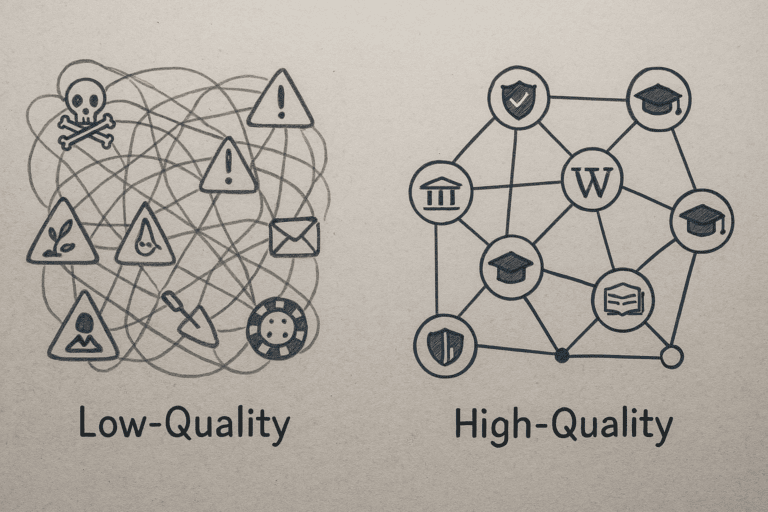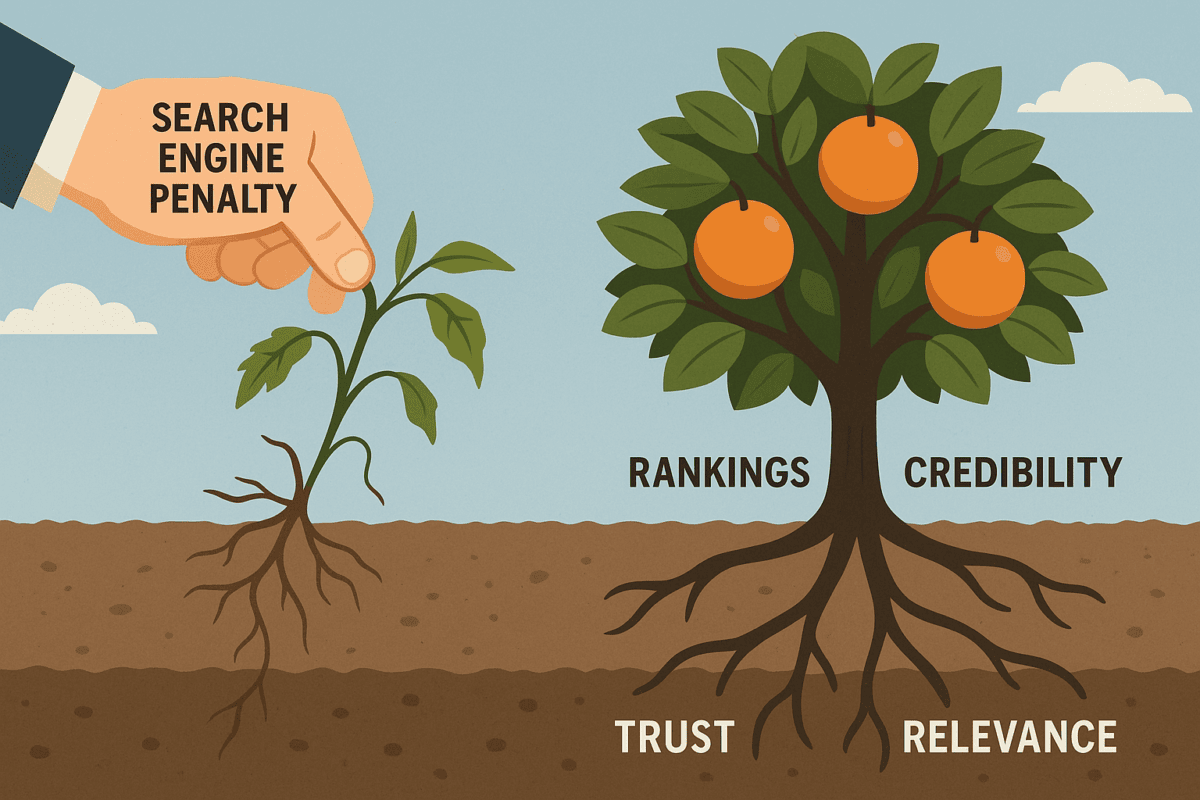The Real Cost of Low-Quality Links
Cheap, low-quality links may seem like a fast track to higher rankings, but they often lead to penalties and long-term headaches.

Cheap, low-quality links may seem like a fast track to higher rankings, but they often lead to penalties and long-term headaches.

The eternal topic – links. Especially those cheap, shady ones. You know, the ones from link exchanges costing mere cents a bundle, auto-generated across old forums and blog comments on sites that haven’t seen fresh content in a hundred years, and all those spammy directories. Tempting? Of course! You dump a bunch of them in, and suddenly your rankings creep up a little – some vanity metrics like X or DR look pleasing. It feels like your work is on fire and your site is finally moving up.

But that joy is usually short-lived. Search engines – whether it’s Yandex or Google (don’t be naive, they aren’t fools) – quickly catch on to this crap. Their algorithms are getting smarter, and spotting a link bought off the discount rack versus a genuine recommendation isn’t an issue anymore.
And then it hits you. Whether suddenly or after the next update: filters, penalties, manual actions, de-optimization, rankings crashing to zero, or worst of all, your site getting booted from the index. Next thing you know, you’re stuck, sifting through all this garbage, wasting tons of time and money trying to dig yourself out of the hole – if it’s even possible. Recovering from these “experiments” is a massive headache and often costs more than you saved on those cheap links. And let’s not forget reputation – if a potential client or partner sees that your seemingly respectable site is linked to by blatant junk or doorway pages, it won’t exactly build trust. They’ll think you’re running a shady operation.
In short, cheap links are like planting weeds in your garden. They sprout up fast, look green and full at first, but then come the aphids, diseases, and penalties from the garden inspector (that is, search engine algorithms), and your entire harvest ends up ruined. Meanwhile, genuine, quality links are like growing an oak tree. It takes time, hard work, and constant care – watering and fertilizing with quality content and strong relationships. Yet once it’s grown, it stands firm, its deep roots proving it’s a solid, trustworthy tree that provides shade (traffic) and acorns (leads/sales).
Relevance and Context
Search engines love logic. Links need to be in context! A link from a cooking blog to a crypto exchange site? That’s just nonsense and doesn’t help anyone. But if a respected travel blog links to your in-depth guide on Thailand, that makes sense – it helps the readers, and the search engine recognizes the value. So, look for websites, forums, communities, and associations in your niche. Offer them your expertise – write a solid guest post (not some spammy ad), give an interview, share your data, and naturally insert a link to relevant material on your site so that it flows organically instead of sticking out like a sore thumb.
Authority and Trust
A single link from a reputable industry portal, a renowned media outlet, or a university website is worth more than a hundred (or even a thousand) links from no-name domains created just yesterday to sell links. Authority rules. When respected experts in your niche link to you, it acts as a powerful seal of approval – a real boost to your site’s credibility. How can you get that? Find the top players in your field. Create something genuinely valuable and unique – conduct research, publish an interesting case study packed with data and facts, gather useful insights no one else has. When you become the go-to source, editors, journalists, and bloggers will naturally want to feature you and cite you as the original source.
Patience, Not Quick Wins
Good, effective link building is not a 100-meter dash – it’s a marathon. You must build genuine relationships with editors, bloggers, and site admins, consistently churn out high-quality, useful content, and stay active in your online community. It’s a long-term game of laying a sturdy foundation that can survive algorithm updates and competitor moves. Don’t expect results overnight or in a week; monitor progress quarterly or even yearly. If your domain authority is rising, organic traffic is slowly picking up, and the referral clicks are coming from real users – not bots – then you’re seeing real, sustainable growth.
Guest Posting on Quality Platforms
Write truly good articles or share unique insights on respected platforms in your industry. You’ll gain a valuable backlink and introduce your brand to a new, relevant audience. Look for publications and blogs where your target audience hangs out. Pitch topics that actually solve their problems or offer a fresh perspective, and include your link naturally – without being overly self-promotional.
Your Own Research and Data-Driven Content
Publish fresh studies, survey results, or data analyses about your industry. When you’re the source of unique info, people will naturally link to you. This positions you as an expert and draws attention from media and bloggers alike. Even a small survey of your customers or an analysis of public stats can make waves – if you present it clearly, draw firm conclusions, and share it with the right people.
Super-Useful Pages (Guides, Resource Pages)
Figure out the most common questions or problems your audience faces. Create the ultimate guide, a curated toolkit, or a comprehensive resource that completely fills that need. Truly useful resources naturally attract links over time and build trust. Pick a significant topic, craft a detailed manual, tutorial, or checklist, keep it updated, and promote it on relevant sites, among influencers, and within niche communities.
Regular Reviews
Periodically check who is linking to you and from where. Junk can appear without your involvement – sometimes competitors even try to harm your rankings by building low-quality links (yes, negative SEO happens). Don’t ignore it, as it may damage your site’s position. Use solid SEO tools (Ahrefs, SEMrush, Moz, etc.) to regularly monitor your backlinks. If you spot a suspicious or clearly junk link, try reaching out to the site admin and ask for its removal. If that fails or the site is irredeemable, use Google’s Disavow tool (Yandex doesn’t have an equivalent, but it often ignores such links anyway) to tell the search engine to disregard those links.
Maintain Relationships
Link building isn’t just a buy-and-sell or set-it-and-forget-it deal. If you gain a link or post a guest article, don’t be a jerk. Thank the editor, blogger, or site admin. Share their content on your social media if it’s relevant, and stay in touch. Good professional relationships can open doors for future collaborations and more high-quality links.
Chasing after cheap, easy links might be tempting, especially when you’re on a tight budget or need quick wins. But the risks are enormous. Filters, penalties, a ruined reputation, wasted time and money – these far outweigh any fleeting benefits. Instead, focus on strategies that build true authority: stick to relevance, create truly valuable content, and nurture lasting relationships in your industry. Yes, it takes longer, is more complex, and often more expensive. But only this approach, based on common sense and ethics, leads to long-lasting top search rankings, strengthens brand trust, and ensures sustainable business growth.
In short, enough with the bullshit and falling into the same traps – it’s time to work smart and for the long haul. Cheap links are a dead end. Or, as some might put it, a one-way ticket to a penalty.
